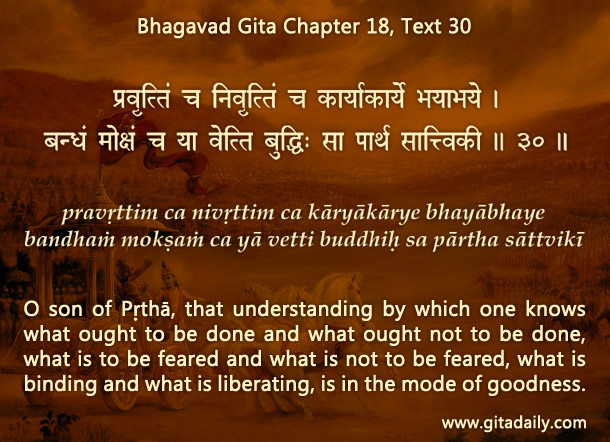To help Arjuna choose wisely, Krishna analyzes in terms of the three modes the various elements of decision-making, including the intelligence (18.30-32). How is intelligence different from knowledge, which was analyzed earlier (18.20-22)? Knowledge is associated with the knowledge-acquiring senses and the proper perception of sensory information. In contrast, intelligence is associated with the working senses and the ability to clearly perceive the right course of action.
If our intelligence is in the mode of ignorance (18.32), we end up mistaking and justifying the wrong thing to be the right thing and the right thing to be the wrong thing. In the battlefield context, such an intelligence would lead Arjuna into a double misjudgment: deem abandoning the fight an act of compassion and deem fighting for the cause of dharma an act of greed.
If our intelligence is in the mode of passion (18.31), we can’t decide which action is right or wrong. Our principles often get mixed up with our desires, leaving us unclear about which action is principle-driven and which desire-driven. At the start of the Bhagavad-gita, Arjuna was in such a confused condition (02.06) before he turned toward Krishna for guidance (02.07).
If our intelligence is in the mode of goodness (18.30), we gain clarity to differentiate between actions that liberate and actions that entangle. As Arjuna’s starting dilemma was his inability to choose between his kshatriya-dharma (duty as a warrior) and his kula-dharma (duty to his dynasty), Krishna’s purpose in speaking the Gita could be said to be elevating Arjuna’s intelligence to the mode of goodness (and beyond to transcendence). And Krishna’s mission was spectacularly successful — Arjuna did gain the desired clarity (18.73).
One-sentence summary:
By analyzing intelligence in terms of the three modes, Krishna guides Arjuna to elevate his intelligence till he can discern his duty clearly.
Think it over:
- How would intelligence in the mode of ignorance affect Arjuna’s duty-discerning capacity?
- How would intelligence in the mode of passion affect Arjuna’s duty-discerning capacity?
- How would intelligence in the mode of goodness affect Arjuna’s duty-discerning capacity?
***
18.30: O son of Prutha, that understanding by which one knows what ought to be done and what ought not to be done, what is to be feared and what is not to be feared, what is binding and what is liberating, is in the mode of goodness.
To know more about this verse, please click on the image


Leave A Comment